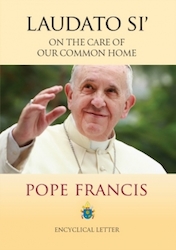Addressing all persons living on the planet, Pope Francis’ LAUDATO SI on Care for Our Common Home, calls on mankind to address climate change and heal earth. Throughout the encyclical he looks at human’s interactions with earth, one of which has caused climate change. He writes that our lifestyles of a “throw-away” society – consumption and waste – must change or humans will bring further harm to our home – earth. And says the “whole human family” must come together to seek sustainable change.
 “I urgently appeal, then, for a new dialogue about how we are shaping the future of our planet,” writes Pope Francis and notes that while efforts have been undertaken, they are not enough. “Regrettably, many efforts to seek concrete solutions to the environmental crisis have proved ineffective, not only because of powerful opposition but also because of a more general lack of interest.”
“I urgently appeal, then, for a new dialogue about how we are shaping the future of our planet,” writes Pope Francis and notes that while efforts have been undertaken, they are not enough. “Regrettably, many efforts to seek concrete solutions to the environmental crisis have proved ineffective, not only because of powerful opposition but also because of a more general lack of interest.”
Pope Francis’ Encyclical spans six chapters with each section focused on a particular area of importance to climate change discussions and one such area is agriculture and the technology the industry uses to feed the masses.
He writes that through technology, such as biotechology, where once humans and nature worked together today, “the relationship has become confrontational”. Pope Francis shows not to be wholly against biotechnology, but not wholly for biotechnology either.
He writes, “Often a vicious circle results, as human intervention to resolve a problem further aggravates the situation. For example, many birds and insects which disappear due to synthetic agrotoxins are helpful for agriculture: their disappearance will have to be compensated for by yet other techniques which may well prove harmful.”
He acknowledges that there are many factors causing soil, and water pollution but points directly to fertilizers, insecticides, fungicides, herbicides and agrotoxins. He writes that “Technology, which, linked to business interests, is presented as the only way of solving these problems, in fact proves incapable of seeing the mysterious network of relations between things and so sometimes solves one problem only to create others.” One such problem solved, he writes, is the feeding of 9 billion people through the use of GMOs but at what cost? He writes that while scientific evidence does not yet show negative health consequences, ongoing science could prove otherwise.
In other words, while he acknowledges that biotechnology (aka technology in general) can be good, it always comes at the expense of something else and these unintended consequences must be considered as technology continues to develop.
